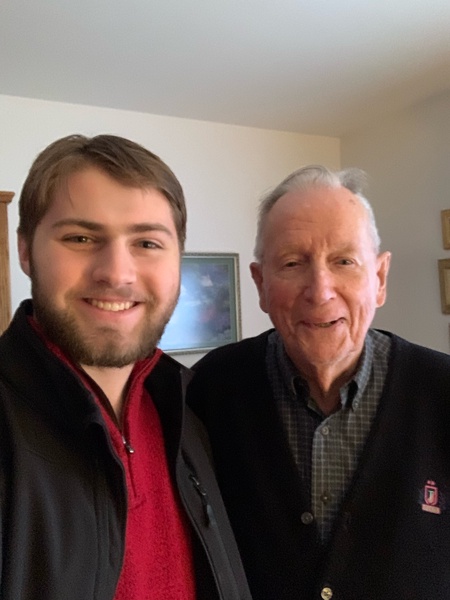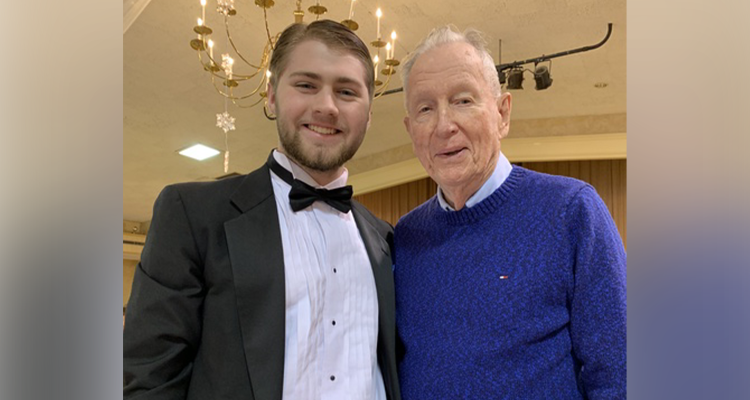We can learn a lot from our elders; that’s something we’ve always heard.
Wheeling Park High School social studies teacher Ryan Stanton decided to put that into practice with his students during the pandemic.
Stanton assigned his students to interview relatives or family friends about how they coped with hardships in the past — war times, the shooting of John F. Kennedy, floods, 9/11, to name a few — and how that related to the hardships we are going through now.
“I created this project as a way for students to connect with family members and reach out to those who may be struggling or feeling lonely during quarantine. I also thought this would be a great time for students to learn from their relatives, and how they may have coped with hardships in the past,” Stanton explained.
The interviews not only helped students connect with their family, it also helped students learn about Wheeling history, he said.
“Whether it was a visit to Wheeling from John F. Kennedy to memories of shopping at Stone and Thomas, students learned a lot about Wheeling’s past. Although I was not teaching from the classroom, students were engaged and learning outside of the classroom,” Stanton noted.
The idea for the project actually came about because of a conversation with one of Stanton’s students.
“While transitioning to quarantine and online learning, I thought about the best way to engage my students while also creating a positive environment during these unprecedented times. Adam Marquart, a senior at Wheeling Park High School, was a student in my History of Wheeling class during his junior year, and his senior year enrolled in my AP U.S. Government and Politics class.
“Throughout his time in my classes, Adam shared his enthusiasm, observations and research with me about various historical subjects. As a teacher, I found our conversations were always prompting me to create teachable moments and future lessons plans,” Stanton said.
Early in the COVID-19 pandemic, Stanton said he recalled thinking about the story that Marquart had shared with him about Robert Rine, now 94, whom he had befriended.

“I thought this would be the perfect time to ask Adam to document some of their conversations. Although Adam’s senior year did not end the way that we thought it would, I want to thank him for taking the time to record an important part of Wheeling history. I also want to thank Robert for sharing his memories,” Stanton said.
Marquart met Rine through his father who was in Rotary Club with him. “I had asked my dad if he knew any WWII veterans, and he introduced me to Bob. That was about two years ago, and we’ve been friends ever since. I’ve gone to him any time I have a question about life in the ’30s and ’40s.
“Our conversations take me back in time to another era. Talking with our elders is most likely the closest thing to time travel we will experience. We should do it more often. I hope you enjoy this trip back in time,” Marquart said.
The following is excerpted from Adam and Robert’s conversation during COVID-19.
Adam: You grew up in Wheeling?
Robert: We lived in Elm Grove for several years on a farm out there. I was out on Fry Road between Roney’s Point in Valley Grove. My mother remarried, and we lived on a farm out there for about five or six years.
Adam: I-70 took away your old street, Bob?
Robert: The ramp did, and all of what was Route 40. I mean that part of Stonebridge they call the Monument Place, we always call it the Stonebridge across from McDonald’s. There at Stonebridge, there was a gas station, and there was a big dip ice cream place and a drugstore and some doctors’ offices and then, of course, the Princess Theater. Then there was the Eagles Club and then there was a Giant Eagle. On the corner across the street was Charlie Zambito’s pool room. This was in 1970.
Adam: What was Wheeling like in the 1930s?
Robert: I suppose just like any other city but obviously has had a lot of changes over the years. … We used to go into town when I was in high school in the early ’40s. We’d ride the bus from Elm Grove that let you off at 12th and Chapline, and then we would walk from there over to the bridge, which is gone now. We’d walk over town and across the Steel Bridge to the island and then down to the stadium — that’s how we went to the high school football games. You had streetcars in those days. Streetcars ran right past the National Road here where I’m looking now … and then just down the path by Saint Michael that swings over to the right then into Wheeling. You had streetcars electrically operated — that was in the ’30s. I don’t know when the buses came and replaced them.
Adam: When you were in high school, what would the high school kids do for fun?
Robert: There was a bakery truck that came by every now and then, so a lot of us would buy pies for a nickel and stand around there outside the school. We didn’t leave the campus of course since we had afternoon classes, but we’d sit around there on the back steps to the main building and also go around in front and talk and look at the girls of course and watch the traffic go by.
Adam: So going into World War II, you were drafted?
Robert: No, I enlisted. I went into the service training in February of 1944. I didn’t turn 18 until November ’43, and I graduated in June ’43. I did work up in North Wheeling until the following February when I went into the Air Force training. I didn’t make it for pilot training.
Adam: When you didn’t pass pilot training, what did you do in the military?
Robert: I did well on the radio aptitude test, so they sent me to Wisconsin to learn military radio, and I don’t know a thing about that. I wound up in the MPS, military policeman. We were not in combat — luckily I was not in combat. We were in Kunming, China, and in Calcutta, India, in the spring of ’45 and went up through the country and then flew over the hump, they called it, over the hump from India to China. We were in Kunming, China, when the first atomic bomb was dropped, so we knew the end was probably near. The invasion was set for Nov. 1 of ’45, but Japan surrendered. Of course, it wouldn’t have surrendered if the second atomic bomb hadn’t ended things. I didn’t second-guess President Truman for dropping the bomb because he saved millions of lives on both sides probably including mine because I was an MP; we could probably hit the beaches sooner than anybody, and I could have been killed.
Adam: Did you have any significant or interesting experiences?
Robert: It was mostly guard duty just to keep us busy, as I said we weren’t in combat, and so they weren’t going to let us sit around all the time, so you know we guarded places that never really needed to be guarded. We guarded the docks in the end in Shanghai.
Adam: After WW II when it was all over, what was it like going back to normal life?
Robert: Of course I went to college on the GI Bill from ’44 by President Roosevelt, which of course changed my life for the better. If I hadn’t gone on to college, my life would have been completely different. I don’t know what would’ve happened, but it wouldn’t have been as successful or as enjoyable if I hadn’t had the education to move on. I went to WVU in the fall of ’47.
Adam: What was WVU like in your time there?
Robert: The Evansdale campus wasn’t there then — everything was downtown. Woodburn Hall was headquarters for journalism. I think they had probably 3,000-4,000 students at that time. It was smaller than it is now, of course, but it served me well. Then the big break was my getting a job offer from Weirton Steel because I was just working on newspapers. I worked two years on a newspaper in Huntington and under a year on the News-Register here in Wheeling for Harry Hamm, and then I got the offer at Weirton Steel. Of course, it changed my life for the better because it was a better job and more money.
Adam: What was working at Weirton Steel like?
Robert: I was in the public relations department. I was editor of the monthly My Magazine, it was called, the employee bulletin and monthly magazine to be put out. I wrote in there, and then we wrote the newspaper advertising copy and speeches for executives. People don’t realize this, but public relations is mainly a writing job. People think I was “glad handing,” and I was just shaking hands, but that’s false. You’re dealing with people on your end, and you want to help them, but mainly it’s a writing job because, as I said, you’re writing magazines, speeches and copies of news releases.
Adam: In 1963, President John F. Kennedy was assassinated. Where were you when that happened?
Robert: I was on my way to the office when I heard it on the radio. I was stunned. My boss, a guy named Paul Harris, he was a Republican I think, and he wasn’t a Kennedy fan. He was surprised when I told him. When I got up to the office, I said, “I have to go home, I won’t be any good around here or the rest of the day.” I went home right away and watched the whole thing on TV the whole weekend. Obviously, the TV covered everything the whole weekend.
Adam: How long were you working for Weirton Steel?
Robert: We were working with the division of National Steel. National Steel, of course, was in Pittsburgh, and we were still with the division. In 1982, they decided to get out of the steel business. The big shots in Pittsburgh wanted to get out of the steel business, so they said they probably wanted to cut from 12,000 employees to about a thousand, which of course is eventually what happened. I took early retirement while I could qualify for that. I could have stayed on, but I didn’t know if it was going to survive, so I took early retirement then, but I was only 57. I knew I had to keep working, which I did in a variety of jobs …
Adam: And then, when did you actually retire? You said you had to have different jobs.
Robert: My friend Harry Hamm at the News-Register recommended me to Larry Bailey, the state treasurer, so I was his field representative here. I was a magistrate for a year in the 1980s, Brooke County Magistrate, and my friend Judge Ron Wilson appointed me. Then Larry Bailey, I was working for him as treasurer, and he ran for governor in ’96 and lost of course. That’s when I guess I stopped working for good.
Adam: What would be your advice to my current generation, the teenagers of today, in looking toward our future?
Robert: Get an education. You need to be skilled and educated in those areas where there are good jobs … where the pay is good. That would be my advice, obviously the education and the artistic side of your nature. All the arts available to us through Oglebay. You need to take advantage of them.


